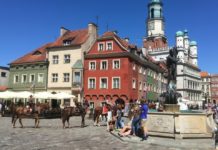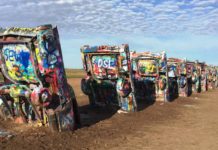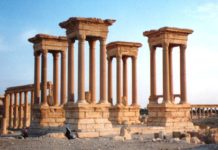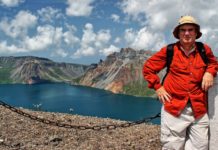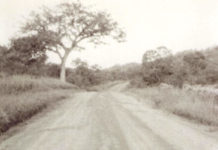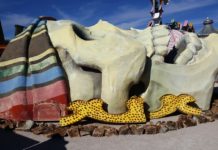CHAPTER 13
Everybody’s had to fight to be free. You don’t have to live like a refugee – “Refugee” by Tom Petty and the Heartbreakers (1980)
Ted and I went to the Ugandan Embassy in Khartoum and applied for our visas. We had no idea how we were going to get to Uganda, or if we could even go at all. With the civil war going on in southern Sudan, our most direct route was completely blocked.
One day, while hanging out at the American Interests Section, we heard breaking news; the war in the south had just ended after nearly twenty years. The two warring factions had reached an agreement, and thousands of refugees would be able to return to their homes.
By asking around, we learned that we could take a bus 200 miles south to Kosti and from there catch a boat to Juba, the capital of southern Sudan. It would bring us within a hundred miles of Uganda’s border.
The staff at the American Interests Section informed us that a reporter from Time Magazine had made the trip five days earlier. Other than that man, we’d be among the first Westerners to travel to southern Sudan since the war began in 1955.
“We crashed the party and eagerly took advantage of the delicious food and non-alcoholic drinks.”
For two nights, we waited in Kosti for the boat to leave. While there, we ran into Bob and Gordon, the two American guys from the youth hostel in Khartoum. The first thing Gordon did when I saw him was grin and whip out a huge joint of marijuana. A local dealer, who lived in a leper colony on the edge of town, had sold the pot to him.
Gordon had long, thick hair that was bright red from henna, a popular hair dye used by women in Arab countries. He was a real wise ass, too. Bob was skinny as a rail and wore extremely tight, worn out, patched up jeans. He had short, shaggy hair, with one long thin braid that grew down his back. A wiry goatee made him look like a cross between a hippie and a beatnik.
Kosti wasn’t much of a town, but there was an administrative building with a recreation area and basketball courts. One evening, while the four of us were hanging around drinking sodas, we heard some music and laughter coming from another part of the complex.
We followed the noise and walked straight into a Sudanese wedding reception that was in full swing. A band with electric guitars and amplifiers was providing the entertainment. Without any difficulty, we crashed the party and eagerly took advantage of the delicious food and non-alcoholic drinks.
One of the band members noticed Gordon was carrying a guitar.
“Are you guys rock and roll musicians?” he asked.
We looked at each other and simultaneously answered, “Yes!”
“Would you like to play a song for us?”
“Sure, we’d love to play a song, wouldn’t we boys?” Gordon answered with a giant smirk on his face.
Within seconds, the guy made an announcement to the crowd that we were special guests from America who were there to perform for them. Immediately, the entire band offered their instruments and begged us to play some American rock and roll.
We huddled hurriedly, made a plan, and took our places. Bob was on the keyboard, Ted grabbed the bass, and I was on the drums. Gordon insisted that we play Neil Young’s Southern Man because he knew the guitar chords. Although we absolutely murdered the song, somehow, we got through it. When we were finished, the audience sat there in stunned silence, apparently unsure of what they had witnessed. Slowly, they broke into polite, scattered applause. After thanking the band for letting us sit in, we quickly left the stage.
“Let’s get out of here before they ask us for an encore!” Gordon said as he laughed.
As we got ready to leave Kosti, I asked Gordon to bring me to the leper colony. Back in Cairo, I had bought a leather tobacco pouch in a marketplace, and my hope was to fill it up with pot for the long trip to Juba.
“He pointed across the street to the police station and told Gordon and me to follow him.”
Naturally, I was kind of creeped out, but Gordon assured me that it wouldn’t be too disturbing. After a short walk to the edge of town, we came upon the lepers’ craggy plot of land. It was filled with rundown shacks and tents along with some cook fires burning in the open.
One old man was particularly pleased to see us approach. He gave a big toothless smile and held out his arm. I was shocked when I saw a stump but no hand; his other hand had only two fingers. The man knew exactly why we were there. I handed him some money, and he took out a large paper bag full of weed. I held up my pouch and motioned for him to fill it up. With his functioning fingers, he packed it full.
As I turned to leave, I bumped into a guy who had been standing literally an inch behind me without my knowledge. When I looked at his uniform, I realized that he was a police officer who had been watching over my shoulder as I made my purchase. In limited English, he informed me that purchasing and smoking pot were illegal in Sudan. Then he pointed across the street to the police station and told Gordon and me to follow him.
I was terrified, to say the least, and desperately tried to figure out what to do. As we headed to the police station, I flipped over the pouch full of pot to the inside of my pants while being careful not to let the policeman see what I was doing.
When we entered the station, we were met by more officers. The man who’d brought us in talked rapidly and excitedly in Arabic presumably telling what he’d seen. Gordon and I waited sheepishly until the policeman in charge asked me in English what we had done.
I held out my hands to demonstrate that they were empty and patted my pockets to show that they were empty, too. I loudly protested that we were American citizens who needed to leave on the boat to Juba and that I had done nothing wrong.
The head policeman shouted angrily at the officer who had brought us in, and an argument ensued. I assumed that the guy who saw me buy the weed insisted that I must have gotten rid of it. The screaming then abruptly stopped, and we were told to leave.
Gordon was elated. “Did you see that fucker’s face when you said you had nothing on you?” he laughed. “I can’t believe you pulled that off!”
When we got back to the dock, thousands of refugees were hurriedly gathering at the boat, which would be the first one to sail to Juba in years. They looked exhausted, carried what had to be all of their worldly possessions, and were headed back to homes that they weren’t sure still existed. Gordon, Bob, Ted, and I got on the end of the long line.
It turned out not to be a boat at all, but several old barges that had been lashed together. If you counted the rooftop, they were three levels high. Pushing the gigantic, ramshackle contraption would be an ancient river steamer that could have been straight out of the movie The African Queen.
From Khartoum, the Nile River splits into two sections: The Blue Nile, which flows from Ethiopia, and the White Nile, which flows from Lake Victoria, the largest lake in Africa. We would be steaming up the White Nile, passing through one of the lushest parts of the jungle, and heading right into the heart of Africa. The four of us staked out a place near the small group of other Westerners and settled in for a long trip.
Many of the passengers had small stoves. They’d brought all kinds of food for the voyage, from bags of rice and flour, to chickens that they would kill and eat along the way.
As usual, we hadn’t planned well. We did have some food but certainly not enough. The trip could take from ten days to three weeks, depending on seasonal conditions in the Sudd, the swampy part of the river that was in a constant state of flux. The boat would make stops along the way, and we hoped to find food at some of them.
Our transport was like a miniature city crawling up the river. Relentless noise from hundreds of voices and the steady hum of the ship’s engine made it impossible to find any peace and quiet. Permeating the air were the smells of an impoverished community. Everyone was constantly cooking food on charcoal fires, and the stench of raw sewage from the primitive bathrooms was nauseating.
As I explored various decks on the barges, it became obvious to me that the crowd was broken down by race and class.
Camped out on the upper deck of one of the front barges were at least a hundred Arab soldiers, who were protecting the captain and his quarters. All were in uniform. The soldiers were not friendly, and I avoided them at all costs. Lower decks were packed tightly with Sudanese refugees returning to their homes in the south.
The Africans we met on the barge were kind people. Despite their hardships, they appeared happy. One man explained to me that the war in Sudan was between the Muslim Arabs in the north, who ruled the country, and the Christian blacks in the south who wanted their own sovereign homeland.
By talking with them, I learned a few phrases in Swahili, like Jambo habari, which was “Hello. How are you?” and Nzuri Asante which meant something like, “Fine, thank you.”
Our group of Westerners consisted of six Scandinavians, three Australians, and us. The quarters were tight, and there wasn’t much to do to pass the time except eat, sleep, talk, and enjoy the scenery.
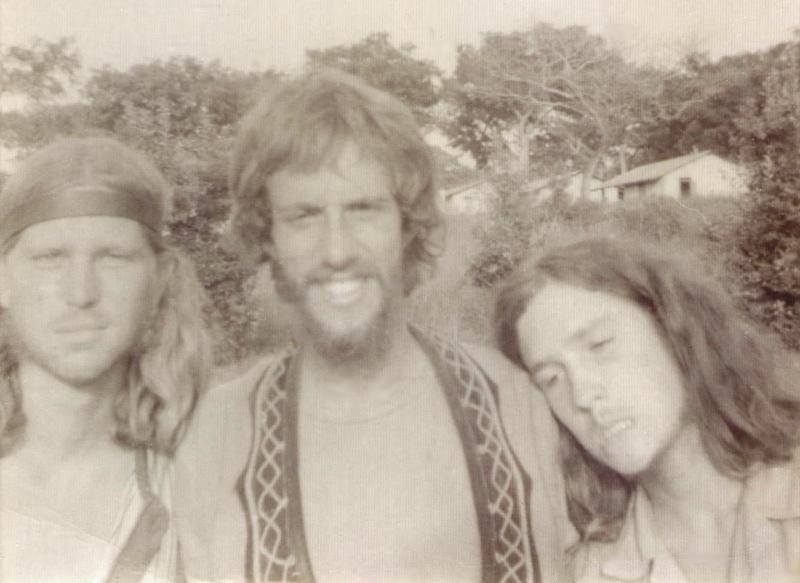
The days on the river were lazy and long. Despite the punishing temperatures and brutal jungle humidity, the view was a spectacular sight to behold. We sailed past tiny villages complete with grass huts set against the dense green jungle. Sometimes we would see native people on the shore dressed in tribal clothing and holding drums or spears. They could have been posing for photos from an issue of National Geographic.
At a wide spot in the river, we sailed past a boat identical to ours. The difference was that it was lying crippled on the bank of the river. Rebel soldiers had attacked and destroyed the boat; it served as a chilling reminder of the war.
Food continued to be a constant source of concern. By pooling our resources, our group could usually come up with enough ingredients to make an acceptable stew for dinner. For other meals, we snacked on anything we could find. Unfortunately, the boat often made its daily stops in remote villages where no food was available to purchase.
If we were lucky enough to locate a general store when the boat stopped at a larger village, we’d buy the entire place out. On a good day, the shopping spree might yield canned sardines, Danish ham, soda, chocolate, and delicious halva. Later, all of the Westerners would get together and exchange provisions. Sometimes I would trade a can of sardines for an orange soda or swap a can of peaches for a chunk of halva.
Gordon and I spent much of the day smoking pot. The African passengers were thoroughly amused by white guys sitting around getting stoned. However, the Arab soldiers were not pleased. One of them caught us and warned us that if we didn’t stop, we would be in big trouble.
After getting busted, we were slightly more careful, but not much. We didn’t treat the soldiers as people of authority. Besides, Gordon and I were two reckless wise asses with little respect for the rules.
“I started feeling the physical pain of hunger, and it was a rude awakening.”
One day, we stopped at a small village populated by people from the Dinka tribe. Most of the women were walking around naked and smoking brass pipes that had been crafted in the village. They were perfect for smoking pot and, of course, Gordon and I each bought one.
After days of slowly moving upstream, the width of the river narrowed significantly, and we entered the Sudd. The banks of the river closed in on us, and the jungle’s trees and shrubs pressed so closely against the barges that it appeared that they might not fit.
As we squeezed through the strait, the slow, powerful engine of the old steamer chugged along, and it seemed to clear a path through the jungle. Eventually, the going became so difficult that the boat came to a halt. For hours, it sat motionless in the swamp, and we waited for the water to rise to inch along again.
While wandering around our floating village, I encountered a group of young African men who were excited about a huge fish they had spotted in the river. It was tangled up in the grassy seaweed and trapped between the barges.
I watched in awe as they leaned over the side of the boat and wrestled with it. The fish put up a hell of a fight, thrashing around desperately and splashing water everywhere. With great difficulty, the men yanked the fish out of the river, threw it on board, and smashed it in the head repeatedly with the blunt side of a hatchet. A river of blood streamed down the deck.
When I got closer to the creature, I realized that it wasn’t a fish at all, but looked like a gigantic lizard. Whatever it was, it was dinner now, and the guys were thrilled to have caught it for a meal. They hooped, hollered, held it over their heads, and paraded around for everyone to see. The men invited me to eat with them, but I politely declined. They ridiculed my squeamishness in a good-hearted way.
“After casually casing the area, we were ready to conduct our raid.”
I started feeling the physical pain of hunger, and it was a rude awakening. Never before had I known the feeling of not being able to get something to eat, and I didn’t like it at all.
During a scouting mission, I noticed a fenced-in area where the soldiers stored their food: potatoes, onions, and turnips. I could tell that if I stuck my arm far enough under the fence, I would be able to reach some of it.
I told my friends that I was going on a food stealing expedition. Ted warned me that I was nuts and wanted no part of it. Bob was never one to look for trouble, so he wasn’t interested. Gordon, on the other hand, eagerly agreed to accompany me.
After casually casing the area, we were ready to conduct our raid. The perfect time was when the soldiers were occupying themselves by sitting around, taking naps, playing cards, drinking tea, smoking, or gazing at the scenery.
Gordon stopped to light a cigarette, I dropped down behind him, and stuck my arm under the chain link fence. I quickly grabbed two big fat potatoes, two turnips, and an onion. I shoved them down my pants, yanked my shirt down as far as it would go, and slinked off into the crowd.
When we returned with our contraband, the whole group was impressed with our daring exploit. The Swedes cooked us a fine stew on their gas stove, and we even had enough for seconds. From then on, raiding the soldiers’ food area became a regular part of our day. However, it wasn’t long before they began to run out of food, too.
Late one night, I was sitting on my sleeping bag and filling my pipe with weed. Again, a soldier caught me and demanded that I put away the marijuana immediately. He firmly stated that it was my final warning. I could tell that the soldier wasn’t kidding, so I feigned remorse and promised that I would not do it again. I didn’t understand why he didn’t take my stash, but I was glad that he didn’t. As soon as the soldier walked away, we all made fun of him. It was clear that I was getting on his nerves.
“Having to face a judge in a strange African city sounded dire.”
I went in search of a safer place to have a smoke. I concluded that the best spot would be the roof of the cabin that housed the Captain’s quarters which was the highest point of the vessel. When nobody was looking, I quietly climbed to the top, lit up my pipe, and enjoyed the view of the Nile River.
Suddenly, an angry face popped up from below. It was the captain himself. Screaming at me in Arabic, he ordered me to immediately go below. I snuffed out the pipe and prepared to face his wrath. Soldiers were waiting at the bottom, and they hurried me into his office.
The captain was sitting behind his desk. He was a short, stocky Arab man who wore a dingy, food-stained uniform and an odd hat that made him look like he was half captain, half hooligan. Although I thought he looked comical, there was nothing funny about what he said. His face was burning red as he spoke to me in broken English.
“You have been warned many times on this boat to not smoke marijuana,” he admonished. “But still you have been seen doing this. I must demand that you surrender your passport to me immediately!”
Wow! That got my attention, but I knew there was no way I was giving that fool my passport. For one thing, I might not ever see it again. For another, I certainly didn’t want to get arrested for smoking marijuana in a place like this.
I pleaded my case by acting truly repentant, and ready to obey his orders not to smoke pot anymore, but the captain wasn’t budging. As much as I tried to avoid it, I handed over my passport. He tossed it into the top drawer of his desk and escorted me out of the office. The captain stated that he would return it when we arrived in Juba, and the local magistrate would deal with the matter.
Having to face a judge in a strange African city sounded dire. Feeling depressed, I moped back to my friends, but Ted didn’t have any pity on me and told me that I had been asking for it. He was fed up that I was constantly smoking pot, creating trouble, and putting us in danger. I knew he was right.
After mulling over the situation, I decided to try my luck at talking to the captain again. Maybe I could persuade him to give me back my passport. Without any idea of what I was going to say, I walked into his office.
“Look, captain, sir,” I said tentatively, “I am so sorry for what I did. I know you were right to punish me, but I need to tell you that I am very worried. I am so frightened that I might be sick if you don’t return my passport.”
With his head slightly tilted, he regarded me with skepticism. But he seemed to be taking what I was saying seriously, so I kept laying it on thicker.
“I mean, I will never go against an order of yours again, sir. I am so concerned about this matter, that I’m afraid I might do myself harm if I don’t get my passport back and get on your right side again.”
He appeared startled and looked at me with wide eyes.
“What do you mean you might do harm to yourself?” he asked.
I thought maybe I had him. Perhaps he was fearful of what would happen if any harm came to one of us Westerners on his ship.
“Well, I’m very serious, sir,” I replied as I started to sob. “I think I’d sooner jump into the Nile River and give myself to the crocodiles rather than not get my passport back right now.”
The captain looked horrified.
“Listen,” he said while fidgeting. “That is crazy talk and not a good thing for you to say.”
He got up from his chair, came around from behind his desk, put his arm around me, and tried to comfort me.
“Look,” he said warmly, “this is not a matter for suicide or for great amount of worry. I will give your passport back to you right now, but you must stop this talk about killing yourself for this offense.”
He patted me on the shoulder, walked back to his desk, opened the drawer, took out my passport, and handed it to me.
“When we arrive in Juba,” he sternly instructed, “you must report to the police station there. You will need to come with me to talk with the magistrate so we can settle this in a proper manner. I assure you that we will resolve it in a way that is fair by Sudan law. Do you understand that, Mr. Cockrell?”
Then he gave me a quizzical look that made me think that maybe I hadn’t fooled him after all.
“Yes, of course.” I replied, “I understand, sir. I will report there immediately after we dock.”
When I told my friends what had happened, Ted shook his head as if to say that I was an idiot, Bob didn’t seem surprised by my behavior, and Gordon laughed his ass off. I knew that I needed to settle down and stop acting like none of the rules applied to me.
As the journey came to an end, the passengers on the boat got excited, packed up their belongings, and anxiously prepared to disembark from what had been our home for more than two weeks. I couldn’t imagine what Juba would be like, and I was wondering how to avoid the captain and the magistrate once we arrived.


